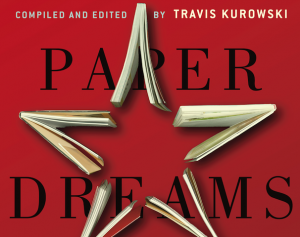Book Review – Paper Dreams: Writers and Editors on the American Literary Magazine
- Book Review
- Sep 9, 2013
- 0 Comments
“I consider [magazines] such easy vehicles of knowledge, more happily calculated than any other, to preserve the liberty, stimulate the industry and meliorate the morals of an enlightened and free people.” –George Washington
Writers that come out of writing programs know the delights and perils of literary magazines. They see them not only as a gateway into larger publications but also as a validation that the work they do is worth something at all. It brings to mind what Stephen King wrote in his book On Writing: A Memoir of the Craft when he said that the way to know one is a writer is by paying a bill with the proceeds received from a story being published a literary magazine. It is a thought echoed in a short piece by T.C. Boyle, “Meat and Potatoes,” wherein the author describes his first experience being published and how much beer could be bought with the money. It’s a fascinating insight into a successful author’s induction into the literary world and is accompanied by numerous other insights in the book Paper Dreams: Writers and Editors on the American Literary Magazine, compiled and edited by Travis Kurowski, who is no stranger to the literary world. He teaches creative writing and publishing at York College of Pennsylvania and was a founding editor of Luna Park as well as the author of the Literary MagNet column in Poets and Writers.
Paper Dreams isn’t simply full of insights into how well-known authors got started publishing, it is an in-depth look at both the history and the culture of literary magazines in our nation. The pieces collected by Kurowski detail the murky history of lit magazines and how the form’s beginnings cannot be pinned down to one exact moment in time, as well as thoughts from editors and authors on the evolution and importance of journals today. Kurowski’s own definition of what a literary magazine is sets the tone for what the book will be dealing with: “A literary magazine is a text object intended to be published at some regularity under the same name and primarily focused on the distribution of literary text, though often also interested in popular culture, politics, and art.” It’s a fine definition and within those words is perhaps the reason why literary magazines are on the rise today. The digital age has given the creators of magazines the ability to put out a product for much cheaper than in the past. While print publications still hold most of the prestige that writers seek, the digital form of literary magazines has been more accepted by the writing community as a valid form of publication. It’s a beautiful thing to consider: literary magazines are the place young writers go in search for that first publication and the vast uptick in magazines available to submit to allows for a greater chance for that first acceptance letter. It also allows editors who may not have had the chance to work at a print magazine to seek out writing that they feel should be validated in one form or another. One of the first pieces in the collection, “Reasons for Creating a New Literary Magazine” by Jill Allyn Rosser, opens with this brilliant line on why to found a new mag: “There probably hasn’t been a new one created in the past six-and-a-half days.” Since her piece comes from 2008, that amount of time is probably even shorter now.
It brings up a thought that Roxane Gay addresses in her piece “Too Many of Us, Too Much Noise” where she explores the inundation of the market and AWP book fairs of print and online magazines and offers some grim but honest (I suspect some in the literary world would say “defeatist”) assessment of the problems facing literary magazines. One quote struck me in particular: “Are literary magazines selling something people (beyond writers) don’t want?” She suggests that this may be so, but with so many aspiring writers there will always be a form of support for magazines. She continues: “Saying writers are the only audience for literary magazines is like saying people who like to swim and go to the beach are the only market for bathing suits.” The stories in literary magazines are meant for everyone, not just those in the hallowed halls of literature.
Not to sound hyperbolic, but I loved Paper Dreams. The pieces Kurowski has included offer a history of a form of publication, its role in literature’s development in America over the last hundred years, insights from writers on literary magazines in the past and the present, as well as brief suggestions on what the process of creating a literary magazine or getting published in one is like. This book was to me what reality television must be like for the masses: it gave me what I was hoping it would, which as a reviewer, is often a hard thing to do. That being said, is this book accessible to everyone? That’s hard to say. It’s more an academic read than a popular read, happy to exist in the realm of the literary peoples of the world, who (I cannot stress this enough) should immediately seek out a copy. Could it have reached a more general audience? Sure, but it would have lost something. And there is the thought that plagued the back of my mind while reading Paper Dreams and returning to the thought from Roxane Gay above: can literary magazines ever be fully accepted by those outside literary circles? Maybe not, but that being said, with the enthusiastic and insular world that literary magazines exist in, maybe it doesn’t really matter. All that matters is the work is out there for those that seek them out, and that may be, as Paper Dreams demonstrates, more than enough.
-Todd Natti Paper Dreams is currently available from Atticus Books.



0 Comments
Be the first to leave a reply!